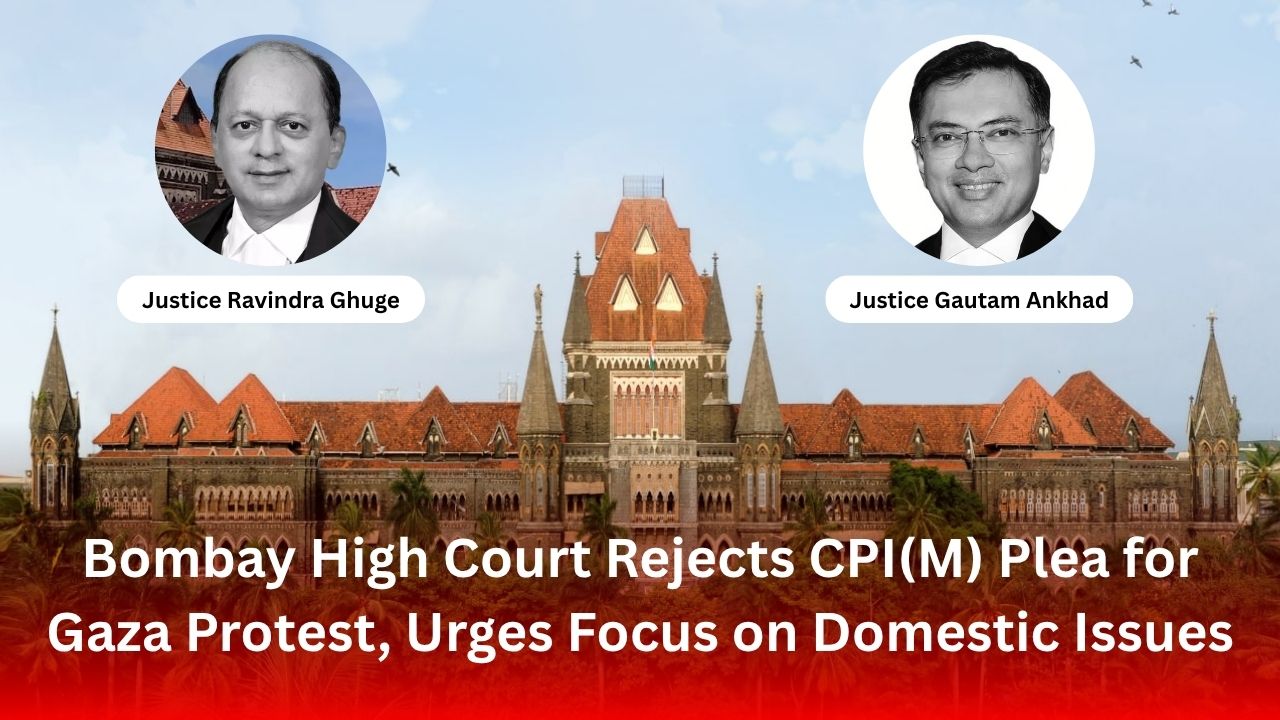Bombay High Court Rejects CPI(M) Plea for Gaza Protest, Urges Focus on Domestic Issues
Editor: Chandan M
Published on: July 31, 2025, 12:38 p.m.

Mumbai | The Bombay High Court has dismissed a petition filed by the Communist Party of India (Marxist) [CPI(M)] that sought permission to organize a protest rally at Azad Maidan in Mumbai in solidarity with the people of Gaza. The court, while rejecting the plea, emphasized the need to prioritize domestic issues and civic responsibilities over protests about international affairs. Background of the Case The petition stemmed from the Mumbai Police's decision to deny permission for a protest planned by the All India Peace and Solidarity Organisation, an affiliate of CPI(M), scheduled to take place at the iconic Azad Maidan. The protest aimed to condemn Israeli military actions in Gaza and show solidarity with Palestinians amid the ongoing humanitarian crisis. CPI(M) approached the court seeking judicial intervention to override the police refusal, arguing that the demonstration was constitutionally protected under the right to freedom of speech and peaceful assembly. Legal Arguments and Court Proceedings Senior Advocate Mihir Desai represented CPI(M) in court. He contended that the proposed protest was well within the bounds of law, to be held at a designated public space, and posed no risk to public order. Desai argued that citizens have a right to express views on international matters, particularly when rooted in humanitarian concerns. However, the division bench of Justices Ravindra Ghuge and Gautam Ankhad disagreed. The court observed that CPI(M) lacked legal standing in this matter, since the party itself was not the original applicant for the police permission—rather, the application had come from the affiliated organization. Beyond the technical grounds for dismissal, the bench made pointed remarks regarding the nature of the protest. The court questioned why a political party was devoting energy to foreign conflicts instead of addressing pressing national problems. “Look at your own country. Be patriots. You are talking about Gaza and Palestine—why not raise your voice about issues here like illegal parking, garbage, pollution, and flooding? This is not patriotism,” the bench observed. The judges cautioned that such foreign policy-related demonstrations by domestic political entities could have unintended diplomatic consequences and distract from the immediate responsibilities of public representatives. CPI(M)'s Response In the aftermath of the ruling, CPI(M) issued a public statement expressing strong disagreement with the court’s stance. The party asserted that the Constitution grants every citizen the right to protest peacefully—even in matters related to international affairs—and that India's foreign policy history includes vocal support for global justice movements, including the Palestinian cause. CPI(M) described the court's remarks as politically biased and out of step with the country's democratic and constitutional values. The party reiterated that solidarity with oppressed people around the world is consistent with Indian traditions and does not diminish patriotic responsibilities at home. Broader Implications The case has triggered national debate on the boundaries of civil liberties, patriotism, and the role of the judiciary in shaping political discourse. Legal experts noted that while the Constitution guarantees freedom of speech and assembly, public order considerations and legal procedure—such as locus standi—still govern the right to protest. The court’s decision has also drawn attention to the larger issue of selective enforcement and the shrinking space for dissent in democratic institutions. While some see the court’s advice as a necessary reminder to focus on domestic governance, others worry that it sets a restrictive precedent for civic activism. Summary The petition was filed by the Communist Party of India (Marxist), seeking permission to hold a protest at Azad Maidan, Mumbai, in solidarity with Gaza. Represented by Senior Advocate Mihir Desai, the party argued that the protest was a constitutional right. However, the Bombay High Court dismissed the petition, stating that CPI(M) lacked legal standing and advised the party to focus on domestic issues like pollution, illegal parking, and civic management. CPI(M) objected to the ruling, emphasizing constitutional protections for peaceful protest and India’s tradition of international solidarity.